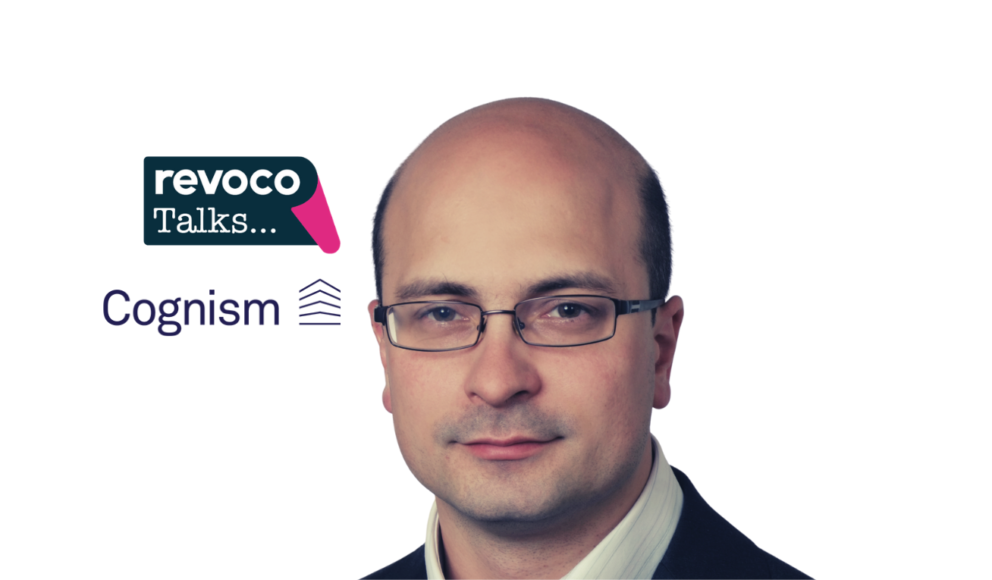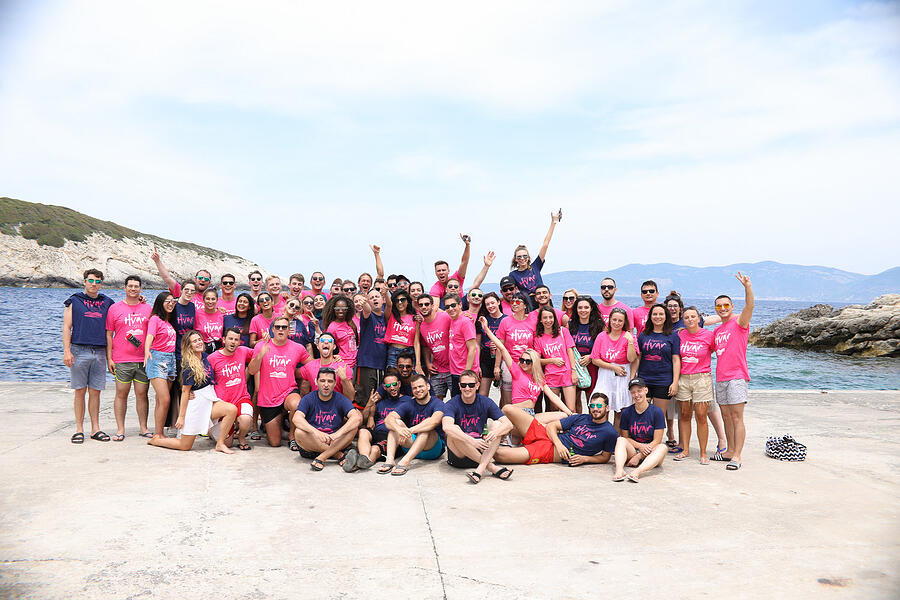Written by:
Harry Butcher
Revoco Talks…fundraising & lessons learnt with Cognism’s James Isilay
Harry caught up with James Isilay, CEO of Cognism for this instalment of Revoco Talks.
Cognism is a start-up on a mission to drive the next evolution of sales and marketing technology, taking prospecting from an art to a science.
Since starting in 2015, Cognism has succeeded in numerous rounds of funding and recognised in Linkedin’s Top Start-ups year on year.
Here, James talks us through his experience growing Cognism so far, including fundraising and lessons he has learnt along the way.
HB: James, it’s great to meet you and thanks for taking the time to speak with me today! Could you kick us off by giving us a bit of an introduction to yourself and who Cognism are?
JI: My name is James Isilay and I’m the CEO and founder of Cognism. As for my background, I studied Electrical and Computer Engineering at Imperial College. I worked as a developer for UBS investment bank for about five years and then did a number of business roles like trading and sales. I then moved away from that and became an algo trader, trading with computers. I did that for about five years at a company called Axpo in Switzerland, and one of the things I was very interested in was using news events to trade the markets. I then took that technology and wanted to apply it to the sales space, with the idea being if you have something like LinkedIn (which has people and company data), you could bring in an event dimension in to build more relevant audiences. From that, I founded Cognism in 2016.
Initially we were actually a FinTech, focused on sales problems in the industry – specifically with hedge funds finding new sources of money. We then pivoted into the general sales and marketing space in 2017, when it really was clear that that market wasn’t a great market to sell into. Moving into this market also allowed us to have a faster sales cycle.
HB: And what was the guiding inspiration behind starting Cognism?
JI: I had a friend called Usman Khan who was the founder of a company called Algomi. At the time, it was kind of like a FinTech unicorn and it was just super energising to go into his office. The energy in the office was incredible as they’d just finished fundraising and were seeing success in their market, everybody was happy and full of energy. That versus the very corporate environment I was in at the time, made me begin to work on my own ideas. I think the concept of building a brick house one brick at a time paid off, where I was looking at ideas and experimenting. In 2016, when the timing was right, I went full time on my idea.
HB: Nice. I’m assuming it was quite a risk jumping into Cognism full-time. Was it just you?
JI: Yeah, it was pretty much just me. I also had a CTO, Stjepan (who is still CTO) which I was paying out of my pocket at the time which worked out well. He later came on as a co-founder, but initially he was a paid contractor.
The first year was just experimenting. I was on a couple of accelerator programmes (FinTech sandbox in Boston and Winton labs in London) which really allowed us to experiment and sign a contract or two to see how that worked out. All of that experience helped us to pivot and take the product into the right place, eventually, in 2017.
It was extremely tough in 2016 because we basically had the wrong product. It was one of those moments where you couldn’t quit because you had built something that gets a little bit of traction but ultimately fails. I had run out of personal funds to fund the idea, so I had to go and take a contracting job again. However, by then we’d built a certain amount of tech which was enough to get us a contract with the Financial Times, and then leveraging that, we managed to get seed funding. Now we have a company with 13 million+ in revenue and 209 employees. It was very much one of those moments where you’ve got to just push on and keep going.
HB: How did you find the experience of fund raising? I see you’ve raised a fair few rounds since, which is great to see!
JI: Fundraising is always difficult. I think there’s a great blog post which talks about things like the 100-10-1 rule, where you have to reach out to 100 investors, you might get 10 meetings and then one person will decide to invest from that. I’ve never really ever stopped fundraising. It’s always an ongoing process in the background. Even when I close a round, I’m planning out the next round and what went wrong in the previous round and doing a new deck. You just have to put as much energy as possible into it. It’s like a sales job, because you’re going out and selling the vision. When investors investigate the company indepth, the smallest things will cause them not to invest. It’s a numbers game.
This week’s sales tip comes from…
Elen John-Morris, Cognism’s superstar SDR. ⭐
Her tip?
Always have a question ready. ☝️
If you’d like to see sales tips on any particular topics, drop a suggestion in the comments! pic.twitter.com/hne0qgqk8Q
— Cognism (@Cognism) February 19, 2021
HB: That ties into my next question quite nicely. What would you say is the best approach to fundraising? Would you say your approach of constantly seeking new investment is the best?
JI: Yeah, if that’s your approach. You can just as successfully bootstrap a business; it just takes longer. It really depends on why you want to fundraise. For me, you want to fundraise if you are a first-time founder. You want to tap into communities of people that have done this before, as it will massively increase your chances of succeeding. It’s the smallest pieces of advice and spotting problems with your go to market/product/retention strategies that make an exponential difference in your outcome.
As for the best approach to fundraising, it’s all about refining your pitch, listening to the feedback when you get it and just keep cracking at it. The more people you reach out to, the higher your chances of success.
HB: When you sit down and assess what went wrong in fundraising after you close a round, what are some of the biggest lessons that you’ve learned?
JI: The biggest thing is to scale, right? Get advice and feedback on your deck and make sure it’s in the right shape. Look at people who have just raised money to get their advice and get them to critically review your deck. And then it’s just scaling numbers. The more people you reach, the higher probability of your success that you’ll connect to the right person. You have to do a lot of work to do that.
HB: And what are some of the biggest lessons you’ve learnt throughout your journey as a founder?
JI: Hiring is a big one. Making sure you have a great hiring process and that you can get the best people you can get (with the budget you have) into those roles. You have to be hands on as a CEO, especially in a start-up, as you need to understand every function very well. You have to understand what’s right, what’s wrong and what other people/companies in your space are achieving, to know if your metrics are out in a particular area. That’s very key.
HB: What have you found the best approach to hiring to be?
JI: We run a strongly formalised process – especially for senior roles. We ask people to do a 30/60/90 day presentation back to us. It really weeds out people that are a bit lazy to do the presentations or aren’t really serious. It saves everybody time. You’ll also see from people who do presentations who’s really sharp. It’s a really great differentiator.
HB: What advice would you give other founders who are in a similar position to where you were and looking at raising funds?
JI: It really depends on the stage. Ideally, when you’re reaching out for seed funding, you’ll have a product and some revenue. You’re going to burn a lot of your time if you try and raise before that. If you haven’t got a product or revenue, but you’ve got a great idea and maybe even an MVP, then you should really be doing friends and family, and maybe angel investors. If you reach out to VC’s, you’ll burn your time on having good conversations that aren’t really going to go anywhere (generally).
In general, you must really map out who to reach out to (i.e potential angel investors that have been in the space before). You need to spend time researching and outreaching as a founder, as you’re the best person to communicate the story. One of the great things about being in the FinTech sandbox programme (and there are other programmes like that you can apply to that will help you with pitching etc) is that they have great mentors that can help you get your deck and financial projections in shape. You really want to get as much feedback as you can. Maybe tier your potential investors and hit the lower tier first to get your presentation really in shape before you hit the higher tiers of investors you’re going after. You could have a great proposition and product, but you need to get that pitch right – especially at seed stage. You can get lost in all the noise because there’s a lot of companies seeking funding – and very few actually getting funding.
HB: Some very useful advice there. And finally, what does 2021 hold for Cognism?
JI: Right now, we’re moving more upmarket towards enterprise, which means we’re hiring account executives/managers to help expand accounts. We’ve got a very strong revenue engine and now we’re really planning out and getting our retention engine to the next level. So that’s very exciting. We’ve just had Ethan Ramsey join us, who’s building out the research function out at Cognism, to take the assets that we’ve already got and take them to the next level.
We’re also doing an acquisition at the moment. We did two last year and we’re going do some more this year. We really want to be that go to market intelligence leader in not just Europe, but the world and I think we’re going in the right direction right now. Things are looking very positive at the moment. I’ve just raised a little bit extra money just so that we got a safety bank, so we’re in a very strong position going forward. Similar to last year, we’re in very uncertain times and it’s very difficult to plan the next month – never mind six months or a year out! Right now, it’s all about having an incredibly strong business, which we do have. I’m excited about the future.
HB: Amazing. It definitely sounds like you got some exciting stuff in there. James, thanks so much for being part of our Revoco Talks series. It’s been great to learn more about Cognism!
Find out more about Cognism by visiting their website and blog, here.
If you’re a founder who wants to share their start-up journey with the wider tech community, we’d love to talk to you. Get in touch here.




